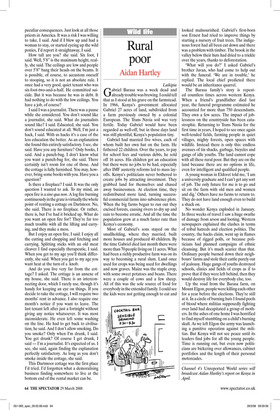Rural poor
Aidan Hartley
Laikipia Gabriel Barasa was a week dead and already trouble was brewing. I could tell that as I stood at his grave on the farmstead. In 1966, Kenya’s government allocated Gabriel 27 acres of land, subdivided from a farm previously owned by a colonial European. The Trans Nzoia soil was very fertile. Today Gabriel would have been regarded as well-off, but in those days land was still plentiful, Kenya’s population tiny.
Gabriel had married five wives, each of whom built her own hut on the farm. He fathered 22 children. Over the years, to pay for school fees and various debts, he sold off 16 acres. His children got an education but there were no jobs to be had, especially after IMF austerity reforms led to mass layoffs. Kenya’s politicians never bothered to create jobs by attracting investment. They grabbed land for themselves and chased away businessmen. At election time, they redistributed more land, turning successful commercial farms into subsistence plots. When the big farms began to run out they excised forests, causing rivers to dry up and rain to become erratic. And all the time the population grew at a much faster rate than Kenya’s economy.
Most of Gabriel’s sons stayed on the smallholding, where they married, built more houses and produced 40 children. By the time Gabriel died last month there were more than 70 people living on 11 acres. What had been a richly productive farm was on its way to becoming a rural slum. Land once used for crops was being used for dwellings and now graves. Maize was the staple crop, with some sweet potatoes and beans. There were a couple of cows and a few sheep. All of this was the sole source of food for everybody in the extended family. I could see the kids were not getting enough to eat and looked malnourished. Gabriel’s first-born son Ernest had tried to improve things by starting a nursery of fruit trees. The indigenous forest had all been cut down and there was a problem with timber. The brook in the valley below their huts had dried to a trickle over the years, thanks to deforestation.
‘What will you do?’ I asked Gabriel’s brother Javan, who had come to help out with the funeral. ‘We are in trouble,’ he replied. The local chief predicted there would be an inheritance quarrel.
The Barasa family’s story is repeated countless times across western Kenya. When a friend’s grandfather died last year, the funeral programme estimated he accounted for more than 750 descendants. They own a few acres. The impact of joblessness on the countryside has been catastrophic. Returning to Trans Nzoia for the first time in years, I hoped to see once again well-tended fields, farming people in quiet villages, mighty forests, open spaces with wildlife. Instead there is only this: endless avenues of tin shacks, garbage, bicycles and gangs of idle youths. The land cannot cope with all these rural poor. But they are on the land because there are no options in life, even for intelligent and qualified people.
A young woman in Eldoret told me, ‘I am a university graduate and I can’t get any sort of job. The only future for me is to go and sit on the farm with old men and women and dig.’ Others have no farms to return to. They do not have land enough even to build a shack on.
No wonder Kenya exploded in January. In three weeks of travel I saw a huge swathe of damage from arson and looting. Western newspapers explained the clashes in terms of tribal hatreds and election politics. The country, the hacks claim, went up in flames because of rigged polls, or because politicians had planned campaigns of ethnic cleansing. But it’s much scarier than that. Ordinary people burned down their neighbours’ farms and stole their cattle purely out of jealousy. Huge gangs of youths destroyed schools, clinics and fields of crops as if to prove that if they were left behind, then they would destroy life for everybody else, too.
Up the road from the Barasa farm, on Mount Elgon, people were killing each other for a year before the elections. They’re still at it. In a circle of burning huts I found pools of blood where militias supposedly fighting over land had decapitated a group of mothers. In the ashes of one home I was horrified to find myself stumbling on a child’s burning skull. As we left Elgon the army was launching a punitive operation against the militias. But Kenya will not see peace until its leaders find jobs for all the young people. Time is running out, but even now politicians are bickering over allowances, cabinet portfolios and the length of their personal motorcades.
Channel 4’s Unreported World series will broadcast Aidan Hartley’s report on Kenya in April.
















































































 Previous page
Previous page